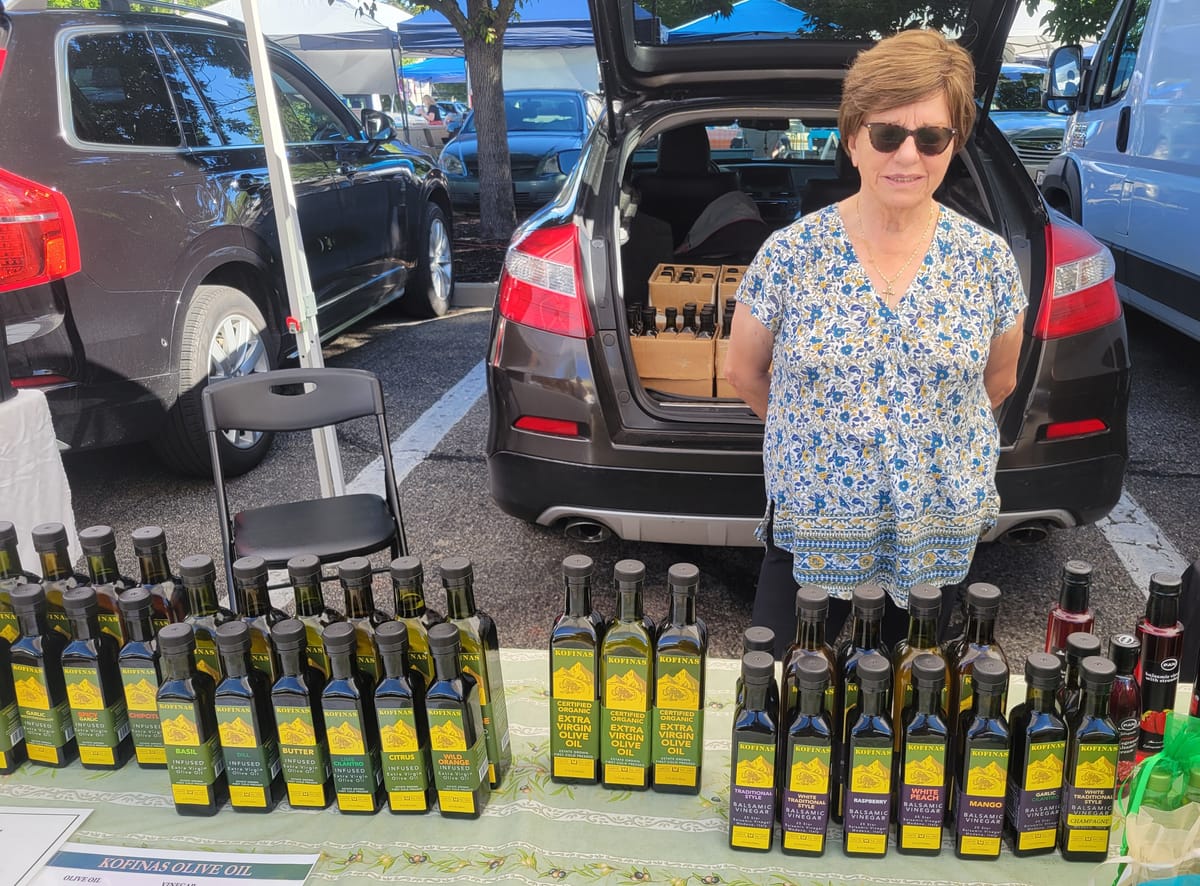Meet the Greek native bringing authentic olive oil to Oxford
Evie Semertzides connects with her Greek roots through her business, Kofina, which bottles olive oil from her tiny hometown of Stavies on Crete.

Evie Semertzides was born and raised in the village of Stavies, population 467, on the island of Crete, in the foothills below Mount Kofinas, a 4,000-foot-high mountain in southern Crete. The name is said to derive from the mountain’s resemblance to a kofini, a woven wicker basket traditionally used for collecting and transporting grapes.
Evie’s family has grown and harvested olives in the foothills of Mount Kofinas for many generations. Each winter, Evie joins the family in Savies to help with harvesting the olives by hand between December and February.
Shortly after harvest, the olives are brought to the village’s mill, where they are separated from branches, washed, and cold-pressed. The pressed oil is stored in barrels for two months before it is sent across the Atlantic on a ship, then brought to Cincinnati.
Here in Southwest Ohio, Evie decants the oil into individual glass bottles of varying sizes that are also imported from Greece. Some of the bottles are infused with herbs and spices, such as basil and garlic, while others are left unflavored.
Evie sells her olive oil through Kofinas, her family-owned company. She’s a regular at the Oxford Farmers Market every Saturday morning and sells her locally bottled products in MOON Co-op, as well.
The olives are tiny, and relatively hard to press, but they yield intensely flavored oil. Evie calls the olives psiloelea, which translates as “tiny olive.” That’s the name Evie’s family uses for a variety more commonly called koroneiki.
Drought and extreme heat have caused a 33% worldwide reduction in production during the past two years, including a 49% decline in Spain, where one-third of the world’s olive oil is produced, according to the International Olive Oil Council (IOC). Olive oil prices have soared in recent years, including a 36% increase this year, according to IOC. However, I can attest that the price of Kofinas has not increased at MOON Co-op Market and has increased by less than 10% at Oxford’s Farmers Market.
It is important to buy olive oil from a trustworthy source like Kofinas. The sharp production decline and price increase has resulted in a substantial growth in olive oil sold as “extra virgin” that has in fact been diluted with vegetable oil.
Kofinas is an example of estate-grown first cold pressed extra-virgin olive oil. “Extra-virgin” means that the acidity level of the oil is less than 1%; Kofinas’ products have an acidity level between 0.2% and 0.4%. “First” means the olives used in the process were crushed and pressed only once, as soon after harvest as possible.
“Cold pressed” means that the olives were not subjected to heat, which would make the extraction process easier by thinning the oil product, but would destroy some of the flavor and nutrition. A heated process is generally used for low grades of olive oil commonly found on grocery store shelves.
Evie writes that her olive oil “comes directly from the family’s groves, is pressed, and sent directly to our family in the United States. We guarantee our single source, so you can trust that it’s a quality olive oil.” Thus, Kofinas olive oil is family run from field to bottle, and on Saturday mornings at the Farmers Market from field to customer.
James Rubenstein is president of the Board of Directors for the Oxford Free Press and professor emeritus of geography at Miami University.




